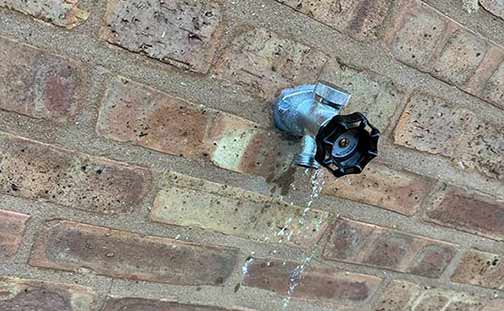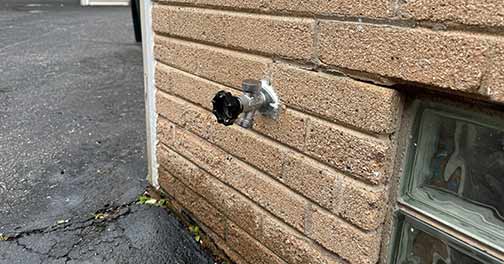
Here we will provide you with valuable information and practical tips to ensure the smooth operation of your outdoor water faucets. If you’re a homeowner, a gardener, or simply someone who loves spending time in the great outdoors, knowing how to troubleshoot and fix common problems with your outdoor water faucets is essential.
Understanding Outdoor Water Faucets
Before we dive into troubleshooting common issues, let’s take a moment to understand how outdoor water faucets work. Outdoor water faucets, also known as hose bibs or spigots, are typically connected to the main water supply of your home. They provide a convenient water source for a variety of outdoor activities such as watering plants, washing your car, or filling a kiddie pool.
Outdoor water faucets are designed to withstand both extreme temperatures and the elements. However, over time, they can develop issues that may result in leaks, low water pressure, or difficulties in turning the faucet on or off.
Common Issues with Outdoor Water Faucets
Here are some of the most common issues you may encounter with your outdoor water faucets:
Leaks
Leaky outdoor water faucets can waste a significant amount of water and increase your water bill. Common causes of leaks include worn out washers, damaged spindles, or loose fittings. If you notice a leak, it’s important to address it promptly to prevent further damage.
Low Water Pressure
Low water pressure from your outdoor water faucet can make it difficult to effectively water your plants or clean outdoor surfaces. This issue can be due to a clogged or partially closed valve, a faulty pressure regulator, or a problem with your home’s water supply.
Difficulty in Turning the Faucet On or Off
If you’re struggling to turn your outdoor water faucet on or off, it can be frustrating and inconvenient. This problem often occurs when the faucet’s handle becomes stiff or corroded. Rust or debris buildup can also prevent smooth operation.
Frozen Faucets
In colder climates, outdoor water faucets are susceptible to freezing during the winter months. When water freezes inside the faucet or the connected pipes, it can cause cracks or even a burst pipe emergency. Taking preventative measures to protect your outdoor faucets from freezing is essential.

Remember, if you’re unsure about how to handle a specific issue or if the problem persists despite your troubleshooting efforts, it’s always best to speak with a professional plumber for assistance.
Troubleshooting Tips
Fixing Leaks
To fix a leaky outdoor water faucet, follow these steps:
- Turn off the water supply to the faucet.
- Locate the leak by inspecting the faucet and its components.
- If the leak is due to a worn-out washer, replace it with a new one of the same size.
- If the spindle or fittings are damaged, you may need to replace them.
- Tighten any loose fittings.
- Turn the water supply back on and check for leaks.
Improving Water Pressure
If you’re experiencing low water pressure from your outdoor water faucet, try the following troubleshooting tips:
- Check the valve near the faucet and ensure it is fully open.
- If the valve is already fully open, inspect the pressure regulator. If it’s faulty, consider replacing it.
- If the low water pressure is specific to the outdoor faucet, there may be a blockage in the pipe. Try removing the hose or attachment and flushing the faucet with water to clear any debris.
- If the issue persists, you may want to contact a professional plumber to assess and repair or replace the outdoor water faucet.
Easing Operation
To make turning the faucet on or off easier, you can try the following:
- If the handle is stiff, lubricate it with a silicone-based lubricant.
- Use a wrench or pliers to tighten any loose fittings.
- If the faucet is corroded, you may need to replace it entirely.
Preventing Freezing
To protect your outdoor water faucet from freezing, consider these preventative measures:
- Install an insulated cover or faucet sleeve.
- Disconnect and drain any hoses connected to the outdoor faucet before winter.
- Allow a slow drip of water from the faucet during extremely cold weather to prevent freezing.
- If your outdoor faucet has a shut-off valve inside your home, close it during winter to prevent water from reaching the faucet.
Troubleshooting common issues with outdoor water faucets is essential for ensuring their smooth operation. By addressing leaks, improving water pressure, easing faucet operation, and taking preventative measures against freezing, you can maintain the functionality of your outdoor water faucets for years to come.
Remember, if you’re unsure about how to handle a specific issue or if the problem persists despite your troubleshooting efforts, it’s always best to call a professional plumber for assistance. They have the expertise and tools to diagnose and fix more complex problems with outdoor water faucets.
With these troubleshooting tips in mind, you can enjoy the convenience of outdoor water faucets and make the most of your outdoor activities without any hassle.